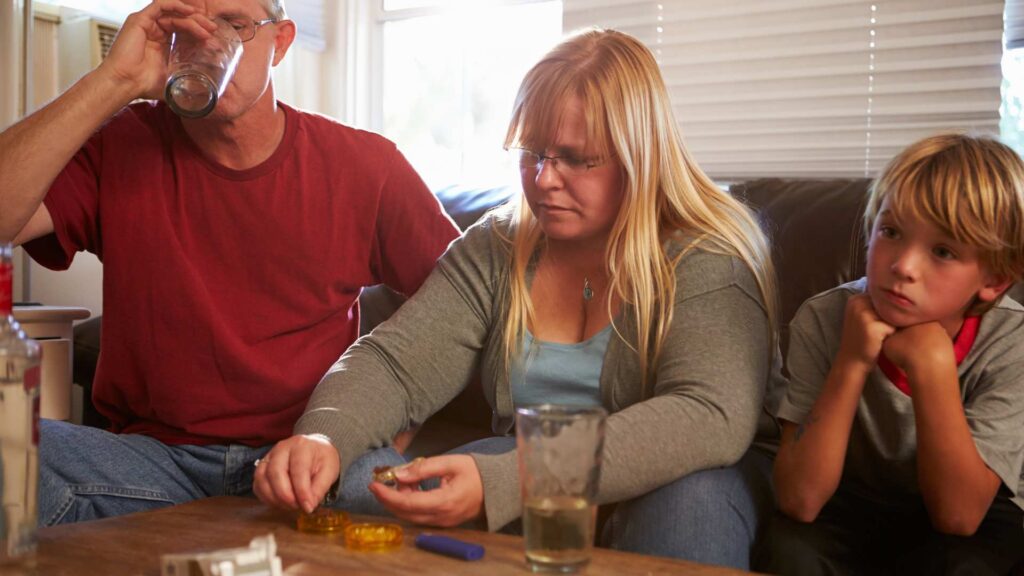Table of Contents
How does a parent’s addiction affect a child?
We often discuss how substance abuse affects not only the individual battling it but also their family, loved ones, and even the broader community. However, what about addicted parents? It’s a topic we might not be used to reading about, and yet, the devastating impact it can have on children is undeniable.
According to data from the 2015-2019 National Survey on Drug Use and Health, nearly 21 million children live with at least one parent who struggles with substance use. Moreover, about 2 million children reside in households where a parent suffers from a substance use disorder (SUD).
With such alarming numbers, you may wonder: How does a parent’s addiction affect a child? Previously, we explored how a child’s addiction affects their parents. Today, in this blog by GateHouse Treatment, we’re shifting the focus to addicted parents, their impact on children, and how these kids can cope with this challenging situation.
Recognize If You Have an Addicted Parents
 If you are reading this blog, maybe it is because you suspect that something is not right with your parents or a close relative; perhaps you have seen some alarms but do not know how to identify whether or not your loved one could be suffering from substance dependence. And yes, identifying a parent’s substance use disorder can be confusing and complex, especially for young children who might not fully grasp what dependence is.
If you are reading this blog, maybe it is because you suspect that something is not right with your parents or a close relative; perhaps you have seen some alarms but do not know how to identify whether or not your loved one could be suffering from substance dependence. And yes, identifying a parent’s substance use disorder can be confusing and complex, especially for young children who might not fully grasp what dependence is.
However, there are signs to look out for, including:
- Frequent mood swings
- Neglect
- Secrecy
- Financial problems
- Lack of sleep
- Sudden behavioral changes
- Memory issues
- Marks on the body
- Strangers frequenting your house
- Conflict
It’s crucial to understand that substance use doesn’t always mean someone is constantly intoxicated; the behavior and emotional absence often create just as much of a burden.
How to Help a Parent with a Substance Use Disorder
Have you identified more than one warning sign? The next thing to consider is how you can help your parents overcome substance abuse and seek help. Regardless of your age, you may feel a responsibility to help your parents get better, as this process will also improve your quality of life.
Helping a parent who struggles with SUD is no easy feat, particularly if you’re still a child or teenager yourself. The most important thing to remember is that you cannot force your parent to change. Addiction is a complex disease that requires professional intervention. However, there are some ways you can offer support:
Start with empathy: Understand that your parent’s addiction is not a reflection of how much they care about you. Addiction changes the brain and compels people to act in different ways they wouldn’t if they were sober.
Seek professional help: Reach out to a counselor, therapist, or trusted adult who can guide you through the process. They can help connect you and your family with treatment options.
Set boundaries: Your safety and well-being should always come first. Setting emotional and physical boundaries with your addicted parent is necessary to protect yourself from further harm.
Encourage treatment: Gently suggesting therapy, rehabilitation programs, or support groups can open the door to recovery, but it’s essential to do so when your parent is sober and open to listening.
Don’t blame yourself: It’s common for children of addicted parents to feel like they’re somehow responsible for their parent’s struggles. But addiction is a complex disease, and no amount of love or effort on your part can “fix” it. Remember, their substance use is not your fault, and placing blame on yourself only leads to more emotional pain. Instead, focus on seeking help and support for both yourself and your parent.

Effects of Growing Up with Addicted Parents
The impact of growing up with a parent battling addiction can manifest in several ways, both emotionally and physically. Children often face instability, unpredictability, and a lack of consistent support. In some cases, they may even have to take on the role of caretaker, managing responsibilities far beyond their years; some also can suffer from parental neglect or abuse.
Moreover, the study “Impact of Substance Use Disorders on Families and Children” shows that a child’s early relationships, especially the attachment to their primary caregiver, shape their emotional and social well-being. If a parent is preoccupied with substance use, they may miss critical opportunities to nurture this bond, leading to insecurity, anxiety, and behavioral issues in the child that can follow them into adulthood.
According to the study “Children of Substance Abusers,” children of parents who struggle with SUDs are at a significantly higher risk of developing similar issues themselves. This situation is especially true for children of alcoholics (COAs), who are more likely to develop alcoholism compared to children whose parents don’t have these struggles. The study emphasizes that when a parent abuses alcohol or drugs, it creates a set of challenging conditions for the child that can increase their likelihood of developing maladaptive behaviors, such as dependence. The most influential factor in this process is the parent’s substance abuse itself, which can put children at biological, psychological, and environmental risk.
Over the years, research has shown the harmful impact parental alcohol abuse can have on their children. For example, the same study found that when mothers stop drinking during pregnancy, their children are healthier. In addition to physical health concerns, researchers have examined how children of alcoholic parents might be more vulnerable to behaviors like academic struggles and, later in life, alcoholism.
Taking Care of Yourself
While it’s natural to want to help your parent, it’s equally important to take care of yourself. Living with an addicted parent can be incredibly stressful, and many children end up neglecting their own needs in an effort to support their parents. Here are some ways to prioritize your own mental and emotional health:
Join a support group: Groups like Al-Anon and Nar-Anon are for family members of people struggling with addiction. These communities provide a safe space to share your experiences and learn from others.
Practice self-care: Don’t feel guilty about taking time for yourself. Engage in activities that make you happy or help you relax, whether it’s sports, reading, or spending time with friends.
Talk about it: Keeping your emotions bottled up can lead to stress and anxiety. Find a trusted adult or therapist who you can talk to about your situation. It’s okay to express your frustrations, sadness, and confusion.
Plan for your future: If you’re worried about the cycle of addiction continuing, take steps now to educate yourself about substance use and seek out a mentor who can guide you through tough decisions.
GateHouse Treatment and Addiction Treatment
If you or someone you know is struggling with the effects of growing up in a household affected by addiction, know that help is available. Substance use disorders can devastate families, but recovery is possible—with the proper support, families can heal and rebuild.
At GateHouse Treatment, we offer comprehensive treatment plans designed to address the individuals struggling with addiction and the family members affected through our family program. If you’re seeking help, don’t hesitate to reach out to us at (855) 448-3588 or contact us online.
Together, we can break the cycle of addiction and create healthier, more supportive environments for everyone involved.
- How a Partial Hospitalization Program Supports Addiction Recovery - March 19, 2025
- Exercise for Addiction Recovery: A Power Way for Healing and Balance - March 7, 2025
- Alcohol Poisoning: How to Recognize and Prevent It - February 26, 2025




